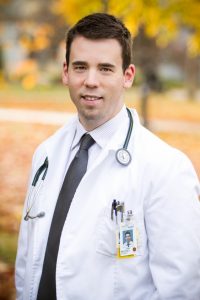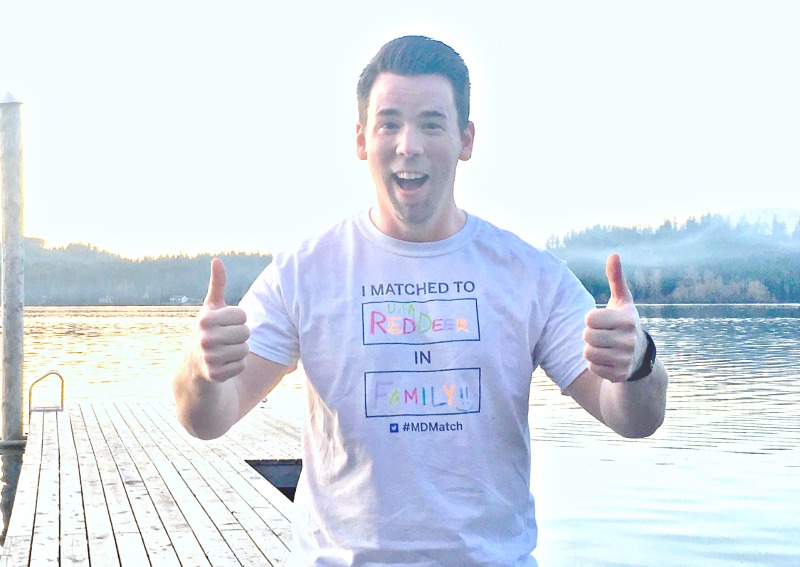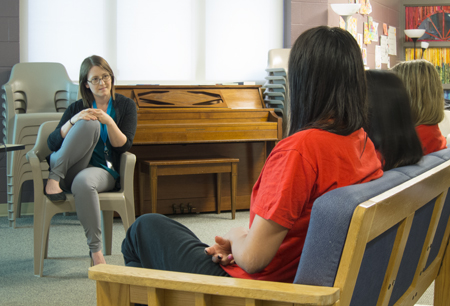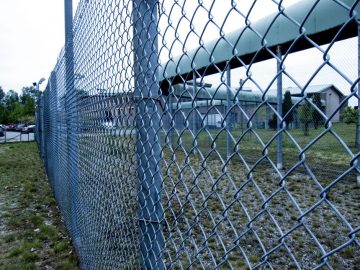![Rebecca MacLean-Angus meeting with four youths at the Burnaby Youth Custody Centre. Photo by Brian Kladko]()
Rebecca MacLean-Angus meeting with four youths at the Burnaby Youth Custody Centre. Photo by Brian Kladko
Matthew Smyth, a first-year medical student at UBC, tries to grab their attention – and hold it – for a lesson in human physiology.
It’s not easy. They are teen-age boys. It is 8:30 am. And they are not a particularly motivated group – they are all in custody.
All of them have committed crimes – some of them serious – for which they have been incarcerated, from just a few days to several years. They are residents of the Burnaby Youth Custody Centre, a secure facility, surrounded by fences and patrolled by guard, at the end of a cul-de-sac in an industrial park, just a few metres from the Fraser River.
Smyth is doing most of the talking, as his classmate, Nazia Hossain, operates a laptop hooked up to a large screen projector. As Hossain starts to show gruesome clips of brain surgery and knee tendon repairs, the boys – all wearing white, institution-issued sneakers, gray or black sweatpants, and gray sweatshirts – start coming to life. One of them, in disgust, pulls a sweatshirt over his face.
“That looks crazy,” one of them says.
“That was pretty sick, man,” another says.
Smyth and Hossain were part of a group of eight second-year medical students who made regular trips to the Burnaby facility over four months to teach the young offenders about health. The lessons – focusing on self-care, drugs and alcohol, mental health and human physiology – were part of a course called “Life Skills” that all residents must take, and which counts as school credit.
For the medical students, it was also coursework. Inspired by a lecture given by Clinical Professor Ruth Elwood-Martin, an expert in prison health, in the first-year course “Doctor, Patient and Society,” they wanted to emulate Dr. Martin’s work for incarcerated people. DPAS, as it’s called, gave them that opportunity, because its spring session allowed students to pursue a “community service learning option.”
After some inquiries, they learned that a group of medical students had provided health lessons at the Burnaby facility a few years ago. That arrangement, however, had wound down after the students moved on with their education. So the group of eight decided to resurrect it.
A taste of teaching
For several of them, spending time at a youth correctional facility aligned with the professional aspirations of working in pediatrics, especially the social dimension of that specialty. For all of them, the visits offered a chance to work on a skill that isn’t explicitly taught in medical school – teaching.
“As doctors, we’re going to be teaching our patients about health care,” says Danielle Murray. “And many of them might not be paticularly receptive. So I was attracted by the challenge.”
A challenge is what they got. The first sessions were rough – not “scary” rough,” more like “first day of teaching” rough. The medical students would give presentations in much the same way that their medical school teachers presented – lecturing while standing at a laptop.
“The first session was really slow,” said Sandy Cerra, Youth Supervisor at the facility, who is in charge of “Life Skills.” “These are youths, and they’re going to be easily distracted.”
“In the beginning, it was tense, because we weren’t on the same wavelength,” Vincent Ye says. “We weren’t really understanding them and they weren’t really understanding us.”
Venturing beyond comfort zones
Cerra urged them to liven things up. He suggested that one of the presenters operate the laptop while the other concentrates on talking directly to the residents, undistracted by technological glitches or the need to advance to the next screen. He also urged them to use the residents’ language, swear words and all. And videos – lots of videos.
“I know the kids. I’ve been working here for 28 years, so I know what they want,” he says.
After following Cerra’s advice, the lessons became more lively, Cerra says.
“They just changed it around,” he says. “It was outstanding.”
“The visits really pushed me out of my comfort zone,” Ye says. “As a medical student, I was concerned about my ability to connect with different populations, to overcome socioeconomic or cultural differences. So this was a really good opportunity to come into contact with an audience that I usually don’t come into contact with.”
After a session for girls that focused on women’s health, the medical students learned that one of those who attended went to the facility’s nurse, asking for a Pap smear.
“That was really positive news for us because we were teaching them about how they could take control of their health,” Murray says.
The hand-off
The second-year students completed their sessions in April, but with the phasing out of the Doctor, Patient and Society course (due to the renewal of the curriculum), its future is a bit cloudy. One of them sent out an appeal to first-year students, and one of them, Rebecca MacLean-Angus, responded.
As a former nurse at St. Paul’s Hospital, MacLean-Angus had considered working in prison health, and had lots of contact with people living in tough circumstances.
“One of my passions is advocating for vulnerable people, helping them to navigate the system,” she says.
![The Burnaby Youth Custody Centre, a secure facility, houses some youths who have committed serious crimes.]()
The Burnaby Youth Custody Centre, a secure facility, houses some youths who have committed serious crimes.
Although the Doctor, Patient and Society course wasn’t available to her anymore, a “Flex” course – part of the new curriculum – offered MacLean-Angus the opportunity to continue the prison health education program through May.
“I’m hoping to pass it on,” she says.
MacLean-Angus, a student in the Southern Medical Program, faced her own challenges on her first day in the Burnaby facility: Upon telling the four groggy-looking girls that she would be discussing mental health, she learned from them that they had already covered the same material during one of the visits of the second-year students.
But MacLean-Angus forged ahead, showing some videos aimed at de-stigmatizing mental illness, and trying to make the session as conversational as possible. Although three of the girls were largely silent, the fourth almost overcompensated by sharing details about her dysfunctional home life and her own struggles.
“My mom wanted to send me to the crazy house,” the girl said, as the sound of heavy metal doors, and the beeping of staff members’ two-way radios reminded everyone that she wound up in another type of institution. “I wanted to get help, but I didn’t want to go there.”
A mini-anatomy lesson
At one of MacLean-Angus’s subsequent sessions, one resident shared his worries about a heart condition he has, and was interested in knowing how health and fitness could help him. Another resident explained how his respect for his older brother had led him into strength training.
Even with the toughest of audiences, there are moments of connection and even education. When Smyth and Hossain’s physiology presentation turned to colonscopies, complete with a video, one boy came alive and asked about hiding drugs in anal cavities.
Smyth didn’t shy away from it, explaining that the colon is built to suck up water, and thus can also suck up a lethal amount of drugs from a ruptured bag.
“Your intestine can only deal with so much,” Smyth tells them. “It’s not meant to deal with a massive bag.”
Smyth, like the other original eight MD students, is now starting a series of clerkships, and will have very little time for the next two years for such outreach efforts. But he knows he will circle back to it.
“We learned that there are very few physicians who are even willing to see youths in prison,” he says. “So whatever field I go into, I’m going to look for opportunities to help these kids. They’ve had really bad luck, but that doesn’t make them bad people, and they have so much potential. I feel so fortunate to see that potential in a place where I wouldn’t expect to find it.”
 Name: Harinder Pal Singh Gill
Name: Harinder Pal Singh Gill Is it just me, or does it feel as though spring has come a bit ahead of schedule this year? I’m quite certain I have seen the daffodils and crocuses popping up much earlier than usual. This is not necessarily a bad thing as, after the darker, colder winter days, one is happy to see the signs of change, colour and – of course – warmth!
Is it just me, or does it feel as though spring has come a bit ahead of schedule this year? I’m quite certain I have seen the daffodils and crocuses popping up much earlier than usual. This is not necessarily a bad thing as, after the darker, colder winter days, one is happy to see the signs of change, colour and – of course – warmth! Stefanie Elliott-Gordo
Stefanie Elliott-Gordo David Mongar
David Mongar Megan Neufeld
Megan Neufeld Ali Moghaddamjou
Ali Moghaddamjou



